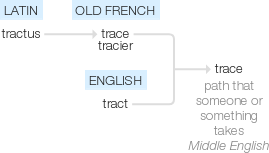Trace
Middle English (first recorded as a noun in the sense ‘path that someone or something takes’): from Old French trace (noun), tracier (verb), based on Latin tractus (see tract1).
wiktionary
From Middle English trace, traas, from Old French trace(“an outline, track, trace”), from the verb (see below).
From Middle English tracen, from Old French tracer, trasser(“to delineate, score, trace", also, "to follow, pursue”), probably a conflation of Vulgar Latin *tractiō(“to delineate, score, trace”), from Latin trahere(“to draw”); and Old French traquer(“to chase, hunt, pursue”), from trac(“a track, trace”), from Middle Dutch treck, treke(“a drawing, draft, delineation, feature, expedition”). More at track.
etymonline
trace (v.)
late 14c., "follow (a course); draw a line, make an outline of something," also figurative; "ponder, investigate," from Old French tracier "look for, follow, pursue" (12c., Modern French tracer), from Vulgar Latin *tractiare "delineate, score, trace" (source also of Spanish trazar "to trace, devise, plan out," Italian tracciare "to follow by foot"), a frequentative form from Latin tractus "track, course," literally "a drawing out," from past participle stem of trahere "to pull, draw" (see tract (n.1)).
Meaning "move along, pass over" (a path, etc.) is attested from c. 1400; that of "track down, follow the trail of" is early 15c. Meaning "copy a drawing on a transparent sheet laid over it" is recorded from 1762. Related: Traced; tracing.
trace (n.1)
"track made by passage of a person or thing," c. 1300, from Old French trace "mark, imprint, tracks" (12c.), back-formation from tracier (see trace (v.)). Scientific sense of "indication of minute presence in some chemical compound" is from 1827. Traces "vestiges" is from c. 1400.
trace (n.2)
"straps or chains by which an animal pulls a vehicle," c. 1300, from earlier collective plural trays, from Old French traiz, plural of trait "strap for harnessing, act of drawing," from Latin tractus "a drawing, track," from stem of trahere "to pull, draw" (see tract (n.1)). Related: Traces.
